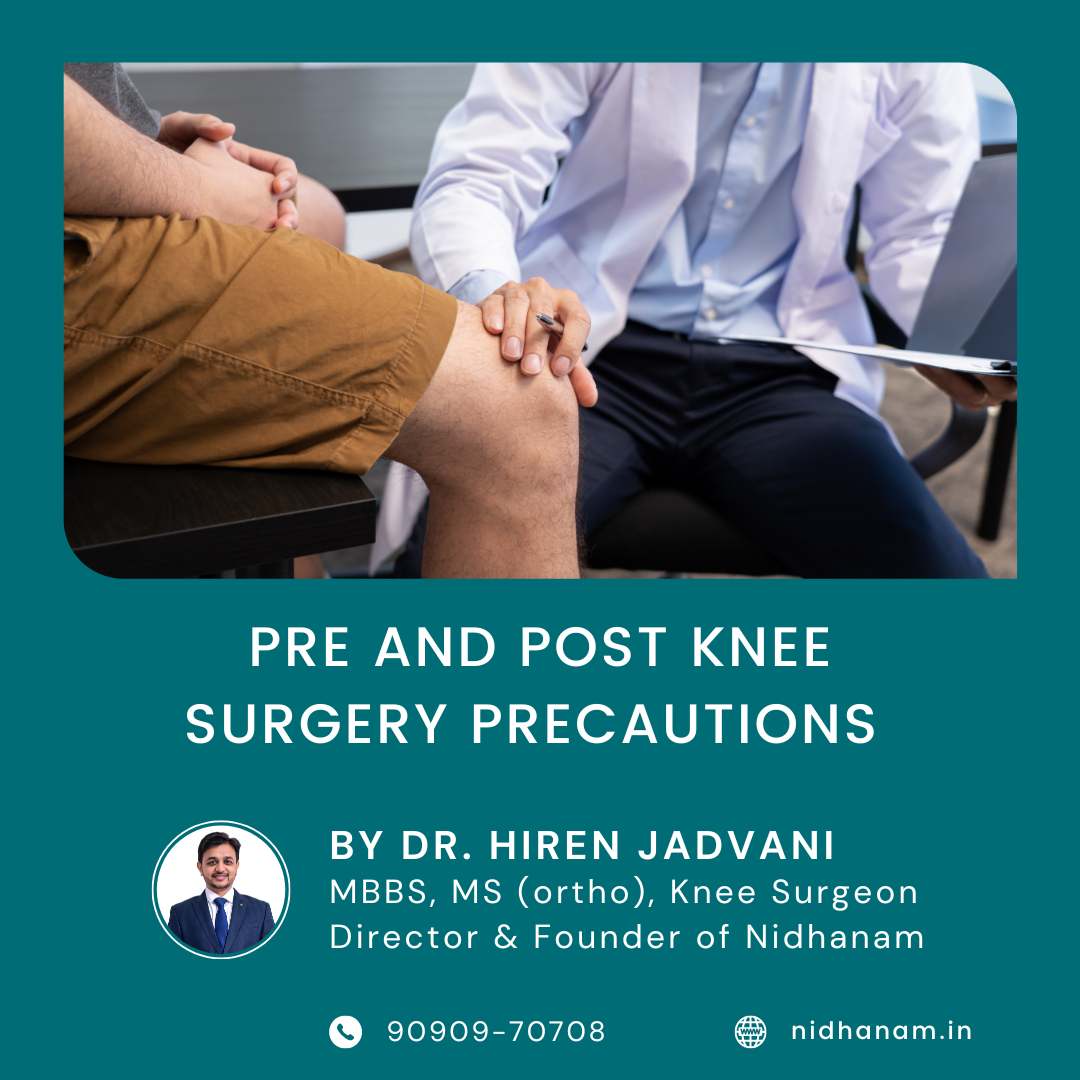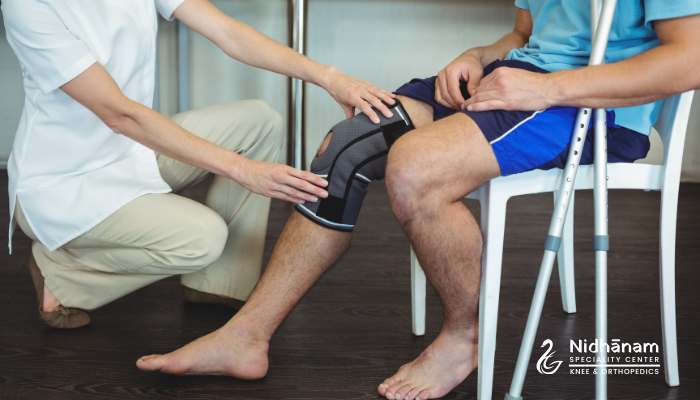Nidhanam orthopedics Center is the best hospital in Surat to provide Knee Surgery treatments. Dr. Hiren Jadvani is the best knee surgeon of Surat, has more than 10 years of experience in performing total knee replacement surgery and knee arthroscopy. In this health blog, he has explained pre and post knee surgery precautions in details.
Preparation is the key for best post knee surgery results. At Nidhanam orthopedics Center, we provide best services for our patients. But there are certain things that patient and his family have to do, and participate in the process. This will help patient recover faster after knee surgery and he or she can go back to routine activities as early as possible.
- Stop smoking and drinking alcohol:
You must stop smoking & alcohol consumption at least a few weeks before surgery because smoking interacts with medications, impairs healing, and increases the risk of blood clots and infection following surgery.
- Begin Exercising:
A weight check is a necessary, and you must begin exercising consistently before the procedure. This will aid in the monitoring of your excess body weight and the recovery process. You must consult with your surgeon and begin upper body conditioning workouts as well as knee joint strengthening exercises. Upper body conditioning helps to prevent muscle soreness and tiredness caused by walking with crutches or canes.
Continue to exercise until the day of the procedure to improve your strength and endurance. Circulation exercises also aid in the prevention of clots and the control of swelling following surgery.
- Plan a Healthy Diet:
Plan your meals in a way that your body gets adequate nutrition as well as helps you remain fit. Include vegetables and fruits in your diet to replenish vitamins and minerals which will help in healing process.
- Prepare Your Home:
This is the most important step as you prepare your home for your arrival after the surgery. Clear out the path- hindering objects like stools, rugs, or extension cords. Prepare your bathroom with a high bathing chair and maybe an elevated toilet seat.
You will also need to arrange for a chair with a firm, straight back. Secure the handrails of the stairs before the surgery. Place all the medications and other daily routine useful items within reach to avoid bending during the recovery phase.
- Manage diabetes & hypertension:
Surgery and stress levels before and after the surgery can affect blood sugar levels. It is very important to control the blood sugar levels before the surgery as it may aggravate risks like infection and other complications. So manage your sugar levels before the surgery so that they are maintained even after the surgery.
Hypertension can lead to complications during surgery. So before undergoing major knee surgery, consult your physician and control diabetes and hypertension with regular medications. Inform your surgeon about these medications as well.
Post knee surgery precautions are very important in the recovery phase. To gain complete mobility after the surgery depends upon post operative routine.
- While bathing and getting dressed:
Bathing requires an anti-slip mat and a firm plastic chair following surgery; you must avoid bending or kneeling for whatever you require. For a while, you may require a raised commode.
Wear your bottoms or pants while standing up when dressed. Take care to put on pants, socks, and underwear on the operated leg first, and then remove the garments from the operated limb at the completion of undressing.
- When seated or lying down:
After the surgery, avoid sitting in a single position for longer than 30 minutes. Avoid using low sofas, stools, or seats. Always sit in a sturdy chair with a straight back and armrests.
It is recommended that you keep your knee straight while lying down and not bend it by placing a pillow beneath the knee. You can work out while lying flat on your back.
- Walking:
The surgeon will recommend that you use a walker or crutches for 4 to 6 weeks after the procedure. Begin by taking little, baby steps. Avoid damp and slippery surfaces by wearing shoes with anti-skid soles.
- Using Stairs
After surgery, avoid long flights of stairs and make sure the handrails are secure. Step up with the leg that was not operated on and down with the leg that was operated on. This will prevent any undue strain on the new knee.
- Must Avoid:
Jerking, twisting, or sitting cross-legged will be strictly prohibited by the surgeon shortly following surgery. In order to avoid putting weight on the new knee, you should avoid carrying big weights and bags following surgery.
Family plays a crucial role in the post recovery after knee surgery. Patient requires help in many routine activities and a family person can really make a difference. So we always encourage to dedicated atleast one of the family member to take of the patient once discharged from the hospital.
Remember, any orthopedic surgery is a team work where right from surgeon & hospital staff to each member of the family of the patient plays vital role in the successful outcome.
Nidhanam orthopedics Center is the best hospital in Surat to provide Total Knee Replacement Surgery. Dr. Hiren Jadvani is the best knee surgeon of Surat, has more than 10 years of experience in performing total knee replacement surgery.
Surgery cost depends upon unilateral or bilateral replacement requirement and also type or manufacturer of replacement. To know more about cost of total knee replacement surgery, book consultation with Dr. Hiren Jadvani.
Frequently Asked Questions
Arthroscopic surgery is a type of minimally invasive surgery that requires only small incisions thanks to a device known as an arthroscope. It lets your surgeon see inside the joints and view the specific area being worked on during surgery without the need for large incisions.
Arthroplasty is the reconstruction or replacement of a joint such as a shoulder, elbow, wrist, hip, knee or ankle. Depending on the extent of the joint injury or condition, you may need partial or total arthroplasty.
Like human bone, the prosthetic devices used in joint replacement surgery can become damaged or simply wear out. If you’ve previously had partial or total joint replacement surgery but need to have the joint operated on again, it’s considered revision surgery.
Advances in medical technologies — including the prosthetic materials used in total and partial hip, knee, elbow and shoulder joints — continue to extend the life expectancy of artificial joints. Generally speaking, today’s prosthetic devices can last upwards of 15-20 years. Factors that can impact the durability of prosthetics include your activity level, overall health, weight and whether you have arthritis.
While the goal of surgery is to restore function and get you moving without pain, there are usually some limitations after orthopedic surgery. Talk to your orthopedic surgeon about realistic expectations after surgery.
There’s no one-size-fits-all answer for deciding when to have surgery. Your orthopedic surgeon or other doctors will help you determine when surgery is the most appropriate next step. Key considerations include whether you’re in pain, if you’re experiencing instability or decreased mobility, and whether the injury or condition is affecting your quality of life.
For first consult, patient will be evaluated with detailed history and clinical examination before he/she is advised suitable imaging. Additionally, it will be helpful to bring along previous X-rays and scans especially related to fractures and for comparative assessment.
A fracture is a broken bone. A sprain occurs when you injure the ligaments that connect your bones.
For most of the patients, average stay after surgery is between 2-5 days, depending on the type of surgery. Discharge is planned when medical condition is stable, pain is adequately controlled with oral medications, able to eat and urinate and when physical and occupational goals are successfully met. Bracing, rehabilitation and after surgery instructions will be provided to the patient at discharge.
Following discharge after surgery, you are required to contact the physiotherapist who will help in optimum post-operative recovery. At Nidhanam Orthopedics Speciality Center we have consultant physiotherapist and rehab expert in our team of doctors to ensure smooth rehabilitation and recovery.


